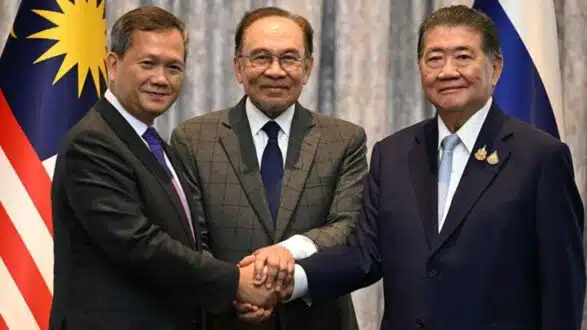In a major breakthrough for regional stability, Malaysia’s Prime Minister Anwar Ibrahim confirmed on Monday that Thailand and Cambodia have agreed to an immediate and unconditional ceasefire, set to begin at midnight on July 28, 2025. The announcement came following high-level peace talks hosted in Malaysia, marking a critical step toward ending the most violent border confrontation between the two countries in over a decade.
Ceasefire Takes Effect at Midnight
Following Malaysia’s mediation offer, both Cambodian Prime Minister Hun Manet and Thailand’s acting Prime Minister Phumtham Wechayachai joined Anwar Ibrahim for talks at the Malaysian leader’s official residence in Putrajaya. Also present were the Chinese and U.S. ambassadors to Malaysia, signaling international backing for the peace process.
At the post-talks press briefing, Anwar stated, “Both Cambodia and Thailand reached a common understanding: an immediate and unconditional ceasefire, effective from 24:00 hours local time, tonight.” He praised both sides for their willingness to halt hostilities and described the decision as “a vital first step to de-escalation and the restoration of peace and security.”
Hun Manet characterized the meeting as highly productive and expressed hope that the ceasefire would end the ongoing conflict. He also acknowledged the severe humanitarian toll, noting that around 300,000 people have been displaced due to the violence on both sides of the border. His gratitude extended to Anwar Ibrahim, U.S. President Donald Trump, and the Chinese government for their roles in facilitating the talks.
Diplomatic and Military Follow-Up
As part of the ceasefire implementation plan, the military commanders of Thailand and Cambodia will convene informally on Tuesday morning. This meeting is intended to solidify field-level cooperation and ensure adherence to the ceasefire terms. Additionally, a more formal session involving defense attachés from both nations, chaired by the current ASEAN leadership, is scheduled for August 4.
Phumtham Wechayachai, addressing the press alongside Hun Manet, confirmed that Thailand had participated in the negotiations in “good faith” and emphasized the country’s ongoing commitment to peace and diplomacy.
Longstanding Border Tensions
The border between Thailand and Cambodia, stretching over 817 kilometers, has long been a point of contention. Disputes primarily center around sovereignty claims over ancient religious sites, particularly the 11th-century Preah Vihear temple and the Ta Moan Thom complex. While both nations have clashed sporadically over the years, the latest escalation saw some of the most intense fighting in recent memory.
The new ceasefire agreement aims to de-escalate these tensions and serve as a platform for broader negotiations on border demarcation and cultural heritage rights.


